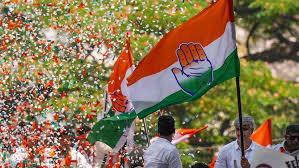I.N.D.I Alliance is failing to come together. Congress appears to be pursuing its political agenda independently.
NEW DELHI: The Congress party’s struggle to secure a foothold in any state or position seems endless. Once again, Congress has attempted to claim the post of Deputy Speaker before the budget session concludes. However, given the government’s stance and the attitude of its allies, it appears unlikely that Congress will succeed in this effort. While the Opposition made an effort to display unity in the final phase of the budget session, it seemed more like a formality. In such a scenario, a conflict over the Deputy Speaker post is highly probable. Throughout the session, the I.N.D.I Alliance lacked cohesion, with no discussions or meetings among Opposition leaders for a joint strategy. In a way, the alliance was already fragmented. Following severe electoral losses in Haryana, Maharashtra, and Delhi, Congress’s allies have distanced themselves from the party. This has led to a situation where, whether in the winter or budget session, the leaders of the I.N.D.I Alliance, formed to challenge the NDA, have not come together. Congress appears to be pursuing its political agenda independently. In the final phase of the budget session, the opposition collectively raised concerns with the Speaker about Rahul Gandhi not being allowed to speak, with the TMC also supporting Congress on this issue. But that was about it.
After the general elections and the formation of the 18th Lok Sabha last year, Opposition parties, led by Rahul Gandhi, strongly opposed the NDA government, disrupting proceedings in the House. Their approach suggested an urgent need to topple the government, directly targeting Prime Minister Narendra Modi. From Lok Sabha to Rajya Sabha, Congress aggressively raised issues related to the Constitution and reservation, possibly believing that the NDA government would collapse after the upcoming state elections. Congress created pressure, leading to an election for the Lok Sabha Speaker’s post. However, TMC dealt the first blow to Congress’s strategy by ensuring the Speaker’s election was conducted through a voice vote. Later, Congress nominated its senior MP K. Suresh for the Deputy Speaker post, but TMC again created obstacles by refusing to support him.
Meanwhile, the Samajwadi Party also expressed interest in the post, leaving Congress in a difficult position. Ultimately, the decision rested with the government. Congress strategists soon realized that securing the post would not be easy. The Deputy Speaker’s position in the Lok Sabha has remained vacant since 2019, and despite efforts, Congress has struggled to gain the necessary support to claim it. During its previous term, the government kept the Deputy Speaker post vacant, and in the 17th Lok Sabha, the Opposition was not in a position to demand it. In the 18th Lok Sabha, Congress went quiet seeing the attitude of its allies. Meanwhile, the BJP went on to sweep the Haryana elections, and then Maharastra and Delhi, even though it lost Jharkhand. Unhappy with the Congress attitude in Haryana, AAP went it alone in Delhi, even as Congress’ I.N.D.I.A bloc partners backed AAP.
Just 10 months after the Lok Sabha elections, the opposition’s stance had weakened significantly. The behaviour of Rahul Gandhi also surprised his allies. He avoided speaking on many key issues and even travelled to Vietnam during the Parliament session. When Congress complained that Rahul Gandhi was not being given enough time to speak in the House, Union Home Minister Amit Shah countered by stating that Congress had been allocated over 40% of the speaking time. It was up to the party to decide how they utilized it. Rahul’s Vietnam visit only raised questions about his seriousness regarding parliamentary proceedings.
Congress has since written to Lok Sabha Speaker Om Birla, demanding an election for the Deputy Speaker post, arguing that its absence is constitutionally inappropriate. However, it remains uncertain whether the government will accept this demand. TMC has already opposed Congress’s claim, and the government has the final say in appointing the Deputy Speaker. There is speculation that the BJP might strategically offer the post to the Samajwadi Party, creating further political turmoil. If that happens, Congress—already isolated in the Delhi elections—could be left alone once again. This possibility has made Congress hesitant about putting strong pressure on the government for the post. Throughout the budget session, Congress remained isolated, and looking ahead, its situation does not seem promising.
Following defeats in Haryana, Maharashtra, and Delhi, opposition parties are hesitant to trust Congress. In Bihar, the alliance with RJD continues due to old ties, but next year, Congress will face a direct contest against TMC in West Bengal. In Kerala, it will compete against the Left parties. With elections happening continuously, Congress is struggling to remain relevant. Apart from Kerala, the party does not seem to be in a strong position anywhere.

